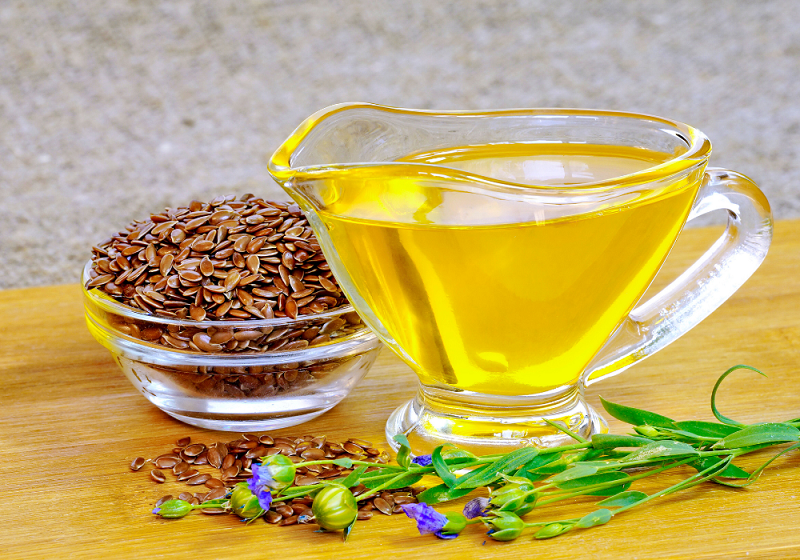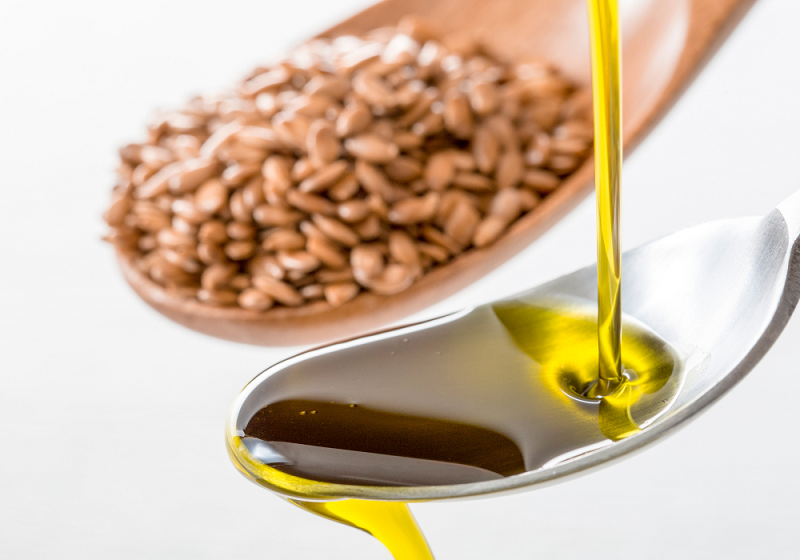It looks like your text got cut off. Could you please provide the complete text you would like translated from French to English?linseed oil has been cultivated and used since ancient times, and has been widely used by oriental medicines. It was already at the source of the health, gourmet, and beauty secrets of our ancestors. Indeed, its high concentration of Omega 3, Omega 6, and Omega 9 grants it an incredible wealth of virtues.
What is the origin of linseed oil?
Linseed oil is pressed and extracted from cultivated flax or "Linum usitatissimum", which is a plant from the Linaceae family. A large number of countries across various continents cultivate flax for its oil. Germany, China, Egypt, France, Russia, Belgium, and Canada, to name the main ones. Previously, flax was cultivated for its fiber, but it is now more valued for its oil.
Linseed oil or flaxseed oil Flaxseed is extracted from the seed It is made from flax. It is golden-yellow in color, with a watery consistency, a rather strong scent, and a sharp taste. Its quality primarily depends on the organic cultivation of the plants grown. It also relies on the techniques used for its extraction. The first cold pressing from organic farming is the best quality possible.

What is the composition of linseed oil ?
The production conditions affect the composition of this vegetable oil. The reputation of linseed oil is based on its high concentration of polyunsaturated fatty acids. Indeed, these fatty acids represent almost 70% of the total weight of the seed.
From a caloric standpoint, linseed oil provides approximately 900 kcal per 100 ml. That said, its high content of alpha-linolenic acid is remarkable with 56 g per 100 ml of the finished product.
Linseed oil is essentially composed of:
Flavonoid
Omega 3
Omega 6
Omega 9
Beta-sitosterol
Stigmasterol
Squalene
Campesterol
Vitamin A
Vitamin B
Vitamin E
Vitamin K
What are the benefits of flaxseed oil for hair ?
Linseed oil is extremely effective for hair damaged by the climate, coloring, and heating devices such as hair dryers. Linseed oil is valuable if you have dehydrated, dry, brittle, unruly, or dull hair. Similar to a hair remedy, linseed oil is prized for taking care of your hair.
How to use it: Do you have dry or brittle hair? You could take a tablespoon of flaxseed oil with each meal. This way, your Omega 3 intake would be fulfilled. You could also apply organic flaxseed oil in place of your usual conditioner or mask on your damp hair.
Used as a styling treatment, it helps to hydrate the hair, combat frizz, and enhance curls. Whether you have kinky, curly, wavy, or straight hair, feel free to use flaxseed oil. To do this, apply flaxseed oil from the roots to the tips of your damp hair after washing. For straight hair, you can braid your damp hair right after washing to achieve beautiful waves.
What are the benefits of flaxseed oil for the skin?
In addition to promoting hair health, flaxseed oil also helps protect the skin. It is extremely useful for treating all the small daily troubles. This legendary oil has a relaxing, soothing, and anti-inflammatory effect on the skin, body, hands, and nails. It promotes skin healing for abscesses, boils, and acne. Additionally, it can help improve skin conditions, chapping, frostbite, and all minor injuries. Its anti-redness and anti-inflammatory properties are useful for overcoming all forms of skin inflammation. On a joint level, flaxseed oil is also effective in combating tendinitis.
Furthermore, this nourishing oil helps maintain skin that is firm, youthful, and radiant with vitality. Its antioxidant, softening, and regenerating properties help slow down the aging of skin cells. It is suitable for absolutely all skin types: tired, dry, mature, sensitive, oily, acne-prone, etc. Similarly, the fenugreek seeds are also renowned for their nourishing properties and can contribute to the preservation of skin health and youthfulness.
You could use linseed oil in your daily beauty routines. To do this, add a few drops of linseed oil to your night or day cream. This way, your cream will be even softer and your skin will benefit from an optimal natural treatment. For intense hydration, you could just as well mix this oil with a body lotion.
How to use and consume linseed oil?
It looks like your text got cut off. Could you please provide the complete text you would like translated from French to English?linseed oil It can be consumed pure and organic, up to one tablespoon per day. This dose can compensate for more than double the recommended nutritional values in omega-3.
In its liquid form, you can fully use this renowned raw linseed oil to accompany all your dishes and dressings. It is important to note that linseed oil does not tolerate heat at all. It is not intended for cooked consumption.
As a nutritional supplement, it is recommended to take 2 capsules, 2 times a day, during or after a meal.
Additionally, flax seeds can be consumed at a rate of 1.1 g per day for women. For men, the appropriate daily amount is 1.6 g.

Does linseed oil have any side effects?
The main side effects encountered when ingesting flaxseed oil are related to the digestive system. In this regard, it is advised to consume it in moderate quantities. Otherwise, it can cause nausea, flatulence, or stomach aches. Its slightly laxative effect can lead to cases of moderate diarrhea.










